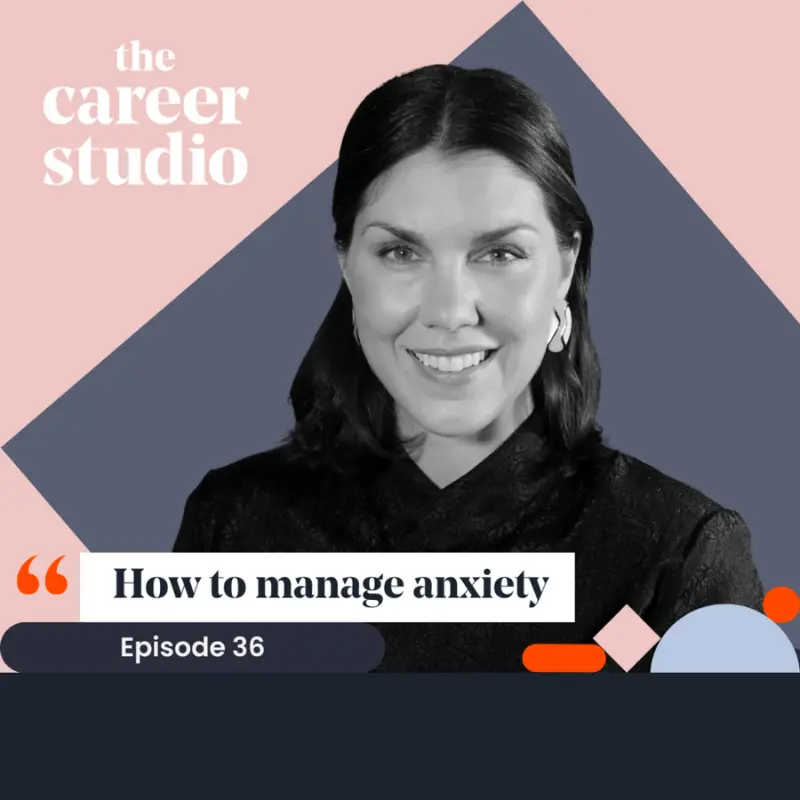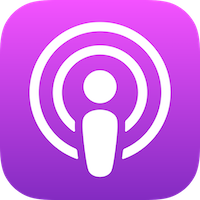How to manage anxiety

Anxiety can block you towards an energizing career you love if you don’t know how to move through it. It’s like a defense mechanism. Learning how to be with it, work with it, and learning how to not make it worse will help you take control and operate from a more grounded, neutral place. In this episode I take you through the typical reactions to anxiety that keep you stuck and how to process it effectively so you can operate from trust and self-confidence instead.
Are you ready to create an energizing career you love?
You can create a career that is simply an extension of who you are and how you want to live your life. If this sounds like what you’re after then let’s explore working together.
Explore my website to learn more about my group and one on one programs.
AND if you're getting value from these episodes I would be so grateful if you can rate and review on whatever podcast app you use. This helps other people like you find and get value from the podcast too.
For more from The Career Studio
Transcript
Welcome to the career studio podcast, where we boil down the noise and focus on the core concepts essential for building an energizing career. You love one. That is simply an extension of who you are and how you want to live your life. Anyone can do it. It's just a matter of knowing what to focus on.
Hi there.
I want to talk about anxiety. It's something so many people struggle with. I think it's especially prevalent in the past decade or so. I think with the advent of the phone and social media, perhaps it's being prescribed more medicines or that can help it theoretically, a lot of people talk about their anxiety.
And, you know, anxiety is an emotion just like all the other emotions. It resulted from hundreds of thousands of years of evolution. And certainly that means it's useful for survival. But what we have to remember is that the world we live in today is so vastly different to the world 500 years ago. And evolution doesn't move as fast as, you know, the industrial revolution and how society has changed.
So with so much of this mindset work that I talk about, we are working with a programming in our brain and our body that isn't quite adapted to modern life. And for so many people, especially listeners to this podcast, life is not. Very dangerous and life is relatively comfortable. All things considered, right?
Compared to a thousand years ago, our anxiety almost has nowhere to go. It doesn't have real things to focus on for the most part. And so our anxiety gets put on other things in our life that don't really deserve the amount of anxiety that we give it. And I will go into all of that in this episode, but essentially anxiety comes from focusing on what we can't control or what we don't know and spinning those situations into worst case scenarios to try and protect ourselves or to try and prepare.
Anxiety is kind of a defense mechanism. So learning how to be with your anxiety, learning how to work with your anxiety, learning how to not make anxiety worse, taking control of your life and the ship in your brain is especially essential to creating an energizing career that you love and the life that you love.
So here is how I think about anxiety and a lot of what I'm going to talk about today I have taken from one of my coaches, Brooke Castillo at The Life Coach school. I, as usual have put in my own spin and added stuff to these concepts, but, you know, a lot of the core of what I'm going to talk about, I took from her.
So shout out to the amazing Life Coach school and all the philosophies there. So yes, let's dive right in. When you're feeling anxiety, the most important place to start is to recognize and name that you're feeling anxiety. This is like with any emotion, naming it validates it and then starts to mitigate it.
So you can either just say I'm feeling general anxiety, or maybe you're feeling survival anxiety. Survival anxiety is when there's a threat that is very clear and specific and imminent. Vague anxiety is just a general feeling of anxiety. Once you have acknowledged your anxiety you then have four options.
So option one, you can resist your anxiety and this is when you don't really want to admit that you have anxiety you make anxiety wrong. You resist the feelings you don't want to feel the feelings you're kind of battling with yourself, denying yourself your anxiety. Emotions that we resist persist and they tend to grow and grow and grow because they're trying to be felt.
Your emotions need to be felt. And when we resist them, it's not good vibes. You can go listen to the episode on how to feel your feelings. But essentially the more we resist them, the more they stay, the more they build, they cause physical pain. They cause us not to do things in the case of anxiety, resisting and resisting.
It can lead you into panicking. Because it keeps growing and growing, you keep resisting and resisting and telling yourself you can't feel it. So it's like this battle that will not be won by you if you resist. The second option is to react to it. And I think a lot of people are here. This is when you get. It's very frenetic when you start to catastrophize and like, scenario plan where you're like, okay, well if I do this, if I call this person, if I make this decision, if I plan it in this way, if I, right, you're kind of trying to outrun your fears.
You're trying to plan and scenario plan so that your.., the worst case scenario doesn't happen. This is you trying to mitigate your anxiety and this is you letting your anxiety run the ship. You're saying anxiety is in charge and I'm taking whatever action it tells me to do. Which is all going to be kind of these panic frenetic actions to try and mitigate the worst case scenarios that you keep playing out in your brain.
Okay. A lot of people are in this space and this can also lead to panic because you're feeding the anxiety. Yeah. That's an important point here. We can feed our anxiety by continuing to catastrophize or like to think about the worst case scenario. And then what about this? And then what about this?This is like feeding it. This is reacting to it and then kind of doing the things you need to do to try and stop or prevent whatever it is you're worried about.
Option three with your anxiety is to avoid it. Okay, so this is when you don't want to feel it, and you do something that masks it, usually something that provides a dopamine hit.We all have our dopamine hits of preference, of choice, you know, it could be drinking, it could be social media, it could be eating, it could be working. You know, whatever it is, we do something to try and not pay attention to our anxiety. But of course, the anxiety is still there. It's just in the background, just like procrastination, right?
It's like this feeling of like, it's there. And like the minute I turn off this TV, the minute I look away from my phone, I'm going to have to deal with it. So let me just stay in this happy dopamine place or not happy, but you know, let me stay in this place. This is how we get addicted to things and to progress with our lives in the way that we want to.
Okay, create bad habits that don't help us grow, et cetera. So I've given you three options that obviously you can tell are not, not my recommendations. And then option four is to actively accept your anxiety. Okay. And so this is, this is what you want with any feeling. You want to acknowledge your feeling and you want to say that it's okay that you're feeling that way.
You know, sometimes we make ourselves wrong for feeling things, and it just makes the whole thing worse because not only are we feeling whatever uncomfortable feeling, but we're also telling ourselves that it's not okay to just add more negativity on top of what is already uncomfortable.
When you actively accept your anxiety, you want to observe it and allow it. And what I mean by that is like, go in your body and find where it's located. What is the shape, the texture, the density, the rhythm, does it have a temperature? The more specific you can get about what your anxiety feels like, the better because you start to see your anxiety as an experience in your body instead of being wrapped up in the experience right by observing it and allowing it, you're watching it and this is starting to separate you from the anxiety.
You're seeing the anxiety as a part of you instead of your entire experience. Okay. So as you start to acknowledge your anxiety, you can breathe into it. You can push it out on the exhale. By doing this, you're giving yourself permission to feel your anxiety to allow it to be there and to watch it, as I said, and it's going to buzz around and it's going to tell you you're in danger and you want to allow it.
You want to allow it without feeding it. So you don't want to go into the place where you're catastrophizing and scenario planning. And what if, what if, and adding to it, you just want to acknowledge you're feeling it say, Hey, okay, okay. Here's some anxiety. Let me feel it. Let me be with it. Let me describe it so that you can start to be the watcher of your experience rather than in your experience.
Okay. And so once you've done that, you can start to ask yourself, what is causing my anxiety? What are the things that I'm telling myself that are making me feel anxious? You can write this down. I call it doing a thought download by writing down whatever phrases are in your brain that are making you feel anxious.
You're going to start to see the narrative that is creating your anxiety. Remember your thoughts create your feelings. So there's going to be certain phrases that you're putting into your brain that create the anxiety. Okay. And that's okay. We all, you know, think things that make us feel anxious, but what's important is to recognize the phrases that make you feel anxious.
I like to call this the TV channel, like seeing your brain like an old school television and different channels that you put on inside your brain will create different experiences, different shows in your body. So cool. There's going to be a certain set of phrases that create anxiety, and this is the anxiety channel.
And so when you say those phrases, that creates anxiety. Okay. And so what you want to recognize is that those thoughts are optional. They're not the only things that you can think about whatever the situation, they're your interpretation of the situation that's making you feel anxious. And what's an important skill to build and what I work with my clients on both one on one and in a group is learning how to change the channel in your brain, learning that you have control over the thoughts that you put in there.
And for a lot of people, this is a revelation. They think they don't have control. But it's just that their mind has not been managed ever before. So the opportunity here is to change the channel by asking yourself, what's another way of looking at the same situation? Often with anxiety, it's focusing on what you can control.
And focusing on the present rather than the unknowns in the future. You can ask yourself, like, what would I need to believe about the same situation in order to feel calm or hopeful or excited or cautiously optimistic? It has to be believable to you now, but write them down. And then that is the narrative that you want to tell yourself.
That's the channel you want to come back to. If you want to create a different emotion, be creative, besides anxiety. And so you can practice putting your brain on a different channel to mitigate your anxiety, but you might still have some residual anxiety and that's okay. You can be with your anxiety.
It's okay to have some residual anxiety. You just have to allow it and be with it and not get caught up with it. Not let it “Go off the rails” and start telling you you're in danger and start having you panic and catastrophize and be in this whole reactive state or dopamine hit, you know, ignore, try and avoid, you know, avoid the situation.
You want to allow it to be there, recognize they're feeling anxiety, make that okay, but still maintain ownership over the narratives in your brain. Okay, this is like advanced thought and feeling work, but you're getting the basics. If you want, you can give yourself anxiety time, which is 10 minutes a day where you go to the worst case scenarios and you play them all out and you let your anxiety get really big.
By playing out all of the worst case scenarios, you're going to feel your anxiety get a lot bigger. Right. And that's actually powerful in itself because you're going to feel the impact of you focusing on something else. Right. And then you can practice making the anxiety smaller by changing your thoughts, coming back to the TV channel that doesn't make you feel as anxious by focusing on what you can control by focusing on what's in the present, by focusing on things that make you feel calm or excited or cautiously optimistic instead.
Right. You know, anxiety and excitement often go hand in hand. They're often two sides of a similar coin. You know, we often feel anxious about new things, but we also feel excited about them as well. So by practicing making your anxiety smaller, you start to see that you have control over the ferocity of your anxiety.
Which, you know, allows you not to be as afraid of it, allows it not to control you as much. So during the day, if some anxious thought comes up, you can delegate it to your anxiety time. You can put anxiety time in your calendar. So I'll think about this later. Okay, so that's basically the anxiety toolkit.
So the most important thing is to remember that anxiety doesn't mean that something has gone wrong. It's a byproduct of our evolution, and it's not a problem until we make it a problem by resisting it, reacting to it, or avoiding it. So instead, you really want to actively accept your anxiety, make it okay that you are feeling anxiety, experience it, breathe into it, and change the channel.
And the last thing I'll say is if you struggle with anxiety and sleep, do a journaling exercise before you go to sleep where you write down what you're anxious about and then what you want to focus on instead. Or you write out your to do list for the next day and things that you're grateful for. This can help you mitigate your anxiety because a lot of times the anxiety is just swirling around in your head. It needs to get out of a page and onto a piece of paper. That's why this app download is really, really useful for anxiety.
Because oftentimes when you see the stuff on paper, you're like, it's crazy.Why am I thinking that? Or you can recognize it as not as powerful as you, as it is when it's in your head. So kind of journaling before you go to bed about what you're anxious about, and then intentionally deciding what you want to think instead or what you're going to do instead that can, that can help mitigate people who kind of struggle to go to sleep because of anxiety or wake up in the middle of the night because of anxiety.
So that's the episode for today. Short and sweet. You do not need to let your anxiety run the show. This all takes practice, but it is absolutely a muscle that you can build that will bring you more peace and less stress.
Have a great week.
Hey, if you're ready to create an energizing career, you love the one where you get to show up every day and be yourself, then let's explore working together. Head over to my website: https://www.thecareer.studio to learn more about my group and one on one programs.
And if you're getting value from these episodes, I would be so grateful if you can rate and review. On whatever podcast app you use. This helps other people like you find value from the podcast too.



